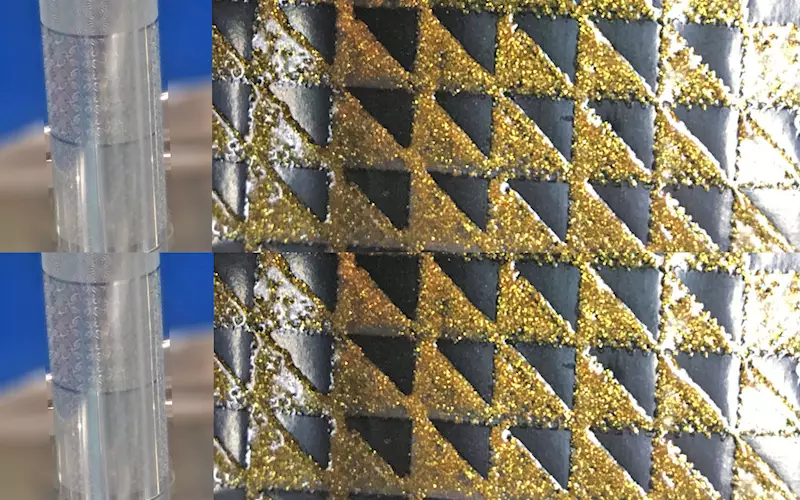Uflex manufactures first glitter printing rotogravure cylinder
Noida-based Uflex recently became the first Indian company to manufacture glitter printing rotogravure cylinder on its state-of-the-art direct laser engraving line. This is an important development because pigments of glitter inks are substantially bigger in size as compared to conventional gravure inks. Therefore, rotogravure printing on substrates using glitter inks has always been a challenge for converters.
05 Mar 2018 | By Rahul Kumar
PK Agarwal, joint president, cylinders business at Uflex, said, “It’s extremely difficult for a cylinder with electro-mechanically engraved conventional gravure cells to pick up pigments of the glitter ink and transfer them on to the substrate. Therefore, in case of this specialised cylinder, we developed bigger sized customised pits (cells) that trap the high solid content of the glitter ink.”
According to Agarwal, the real innovation here is the customisation of cell geometry of the rotogravure cylinder on Uflex’s direct laser engraving line. “Pigments of the glitter ink have a tendency to get stuck inside the pits/ cells of the cylinder (cell filling). When the printing surface is sandwiched between the impression roller and the gravure cylinder, the high solid contents of the glitter ink get transferred from recessed cells to the substrate with the help of capillary action and the tangential force of the roller,” he said.
Agarwal added that glitter inks, unlike other conventional gravure inks, do not possess self-curing properties. Therefore, to enable quick and effective curing of the glitter ink, the company developed a LED curing system and installed it on the proofing/ printing machines at Uflex. The high solid content of the glitter ink on the printing surface imparts superior tactile effect along with the shimmer, tremendously enhancing the shelf impact of the pack, thereby catching the attention of the customer at the already inundated point-of-sale.
“It took us about one month to develop the glitter printing rotogravure cylinder. Our chemicals business simultaneously developed the glitter ink,” Agarwal said, adding, “There is great demand for this type of printing from the convertors of flexible packaging for high impulse buying consumer goods, particularly in the food and confectionery segment, for which we are fully braced.”
The specialty glitter ink has been manufactured for flexible substrates like paper and heat sensitive films and can be cured using LED lamps applied in-line with gravure printing process using solvent or water based ink system.
Uflex manufactures different variants like metallic glitter and polymeric glitter inks, among others. Conventional metallic shades are available only in gold, silver and copper, whereas polymeric glitter inks are available in several colours.
Rajesh Bhasin, joint president, chemicals Business at Uflex, said, “This was one of the toughest challenges posed to us by our clients, wherein we were asked to develop glitter ink for a variety of flexible substrates, including heat sensitive films. This ink was required to perform at high speeds and cure quickly on a gravure press. I am so very pleased that our scientists delivered a truly innovative product, which met the client’s expectations on all parameters within a record time.”
Ashok Chaturvedi, chairman and managing director, Uflex, said, “Addressing a need-gap congruently is the real contribution that the manufacturing industry can ever deliver. I am happy to state that living up to the ethos of being one stop solution for meeting all flexible packaging requirements, our cylinders and chemicals businesses demonstrated perfect synergy and engineered the most contemporary and innovative glitter printing solution in record time delighting our clients.”











 See All
See All